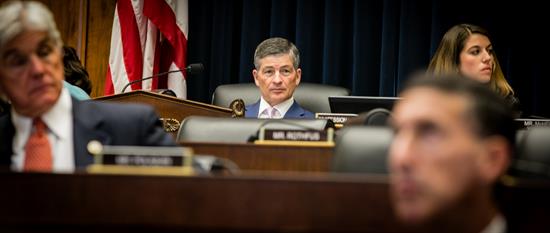House Passes Four Bipartisan Financial Services Bills
Washington,
March 6, 2018
WASHINGTON – Today, the House of Representatives passed four bipartisan bills from the Financial Services Committee, including legislation to address the burden that unnecessary, duplicative, and outdated regulations have imposed on our community financial institutions. “I’m pleased to see these wide-ranging financial services bills pass the House of Representatives today,” said Financial Services Committee Chairman Jeb Hensarling (R-TX). “From helping financial institutions stay in business and better serve their communities to combating transnational financial crime, these bills demonstrate strong and bipartisan legislating while continuing to move our country forward.” H.R. 4607, the Comprehensive Regulatory Review Act, sponsored by Representative Barry Loudermilk (R-GA), amends the Economic Growth and Regulatory Paperwork Reduction Act of 1996 (EGRPRA) to now include the Consumer Financial Protection Bureau (CFPB) and the National Credit Union Administration (NCUA). The legislation also requires these reviews to be held every seven years, instead of every ten years as is current policy. This bill passed 264-143. H.R. 2226, the Portfolio Lending and Mortgage Access Act, sponsored by Representative Andy Barr (R-KY), amends the Truth in Lending Act to allow certain mortgage loans that are originated and retained in portfolio by an insured depository institution or an insured credit union with less than $10 billion in total consolidated assets be considered as qualified mortgages. This bill is based on Section 516 of H.R. 10, the Financial CHOICE Act of 2017. This bill passed by voice. H.R. 4725, the Community Bank Reporting Relief Act, sponsored by Representative Randy Hultgren (R-IL), amends the Federal Deposit Insurance Act to direct federal banking agencies to issue regulations that allow a reduced reporting requirement for depository institutions with $5 billion in consolidated assets or less, and that meet certain other criteria when making the first and third report of condition for a year. This bill is based on Section 566 of H.R. 10, the Financial CHOICE Act of 2017. This bill passed by voice. H.R 4768, the Strategy for Combating the Financing of Transnational Criminal Organizations Act, sponsored by Representative David Kustoff (R-TN), requires the President, through the Secretary of the Treasury, to develop a national strategy to combat the financial networks of transnational criminal organizations (TCOs) not later than one year after the enactment of this Act and every two years thereafter. In particular, the strategy will assess the most significant TCO threats and the individuals, entities, and networks that provide financial support or facilitation to those TCOs. It also reviews current goals, priorities, and actions against TCOs’ financial support networks and will recommend new ways to deter and prosecute those who financially enable TCOs. The bill passed by voice. ### |


